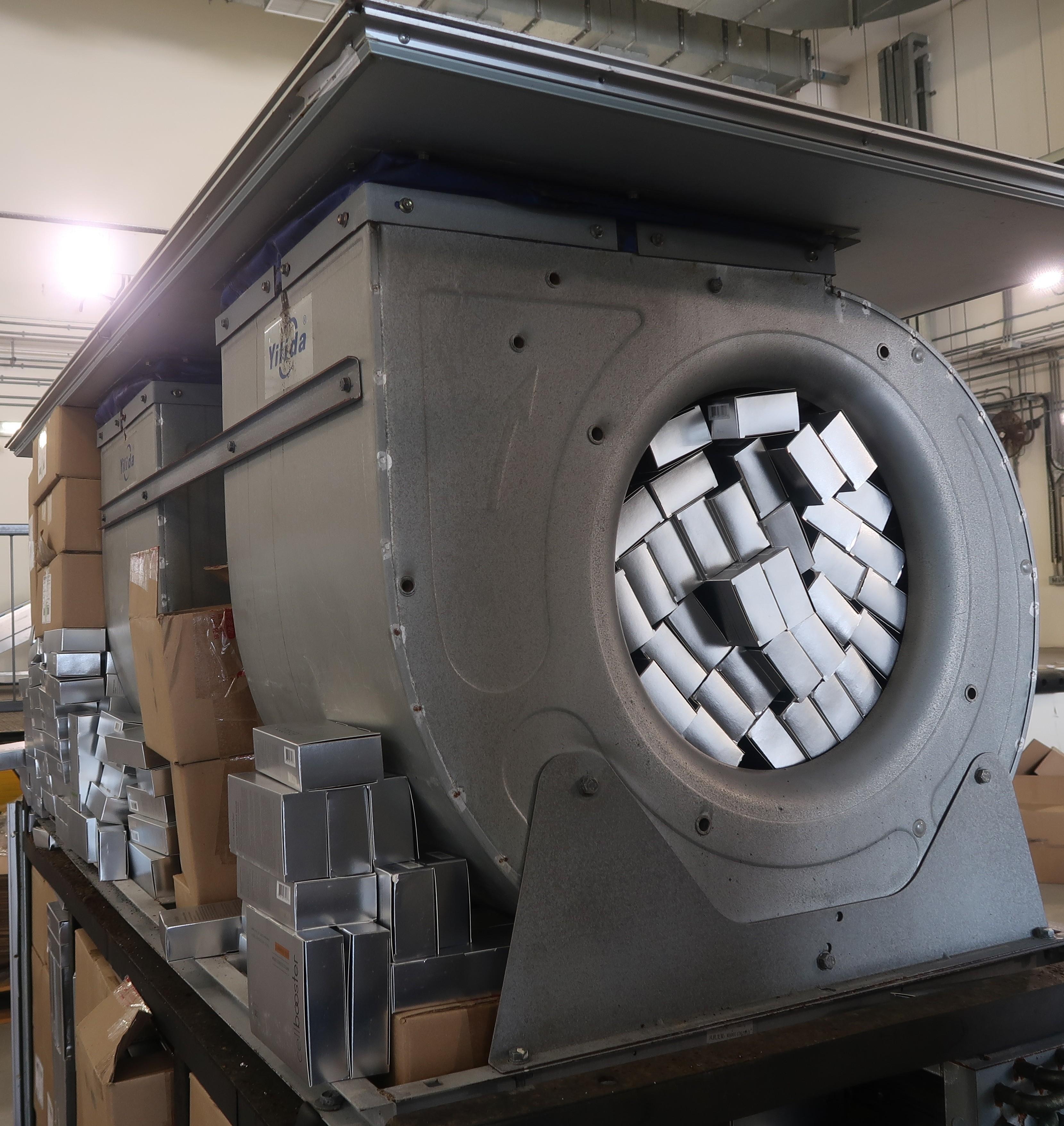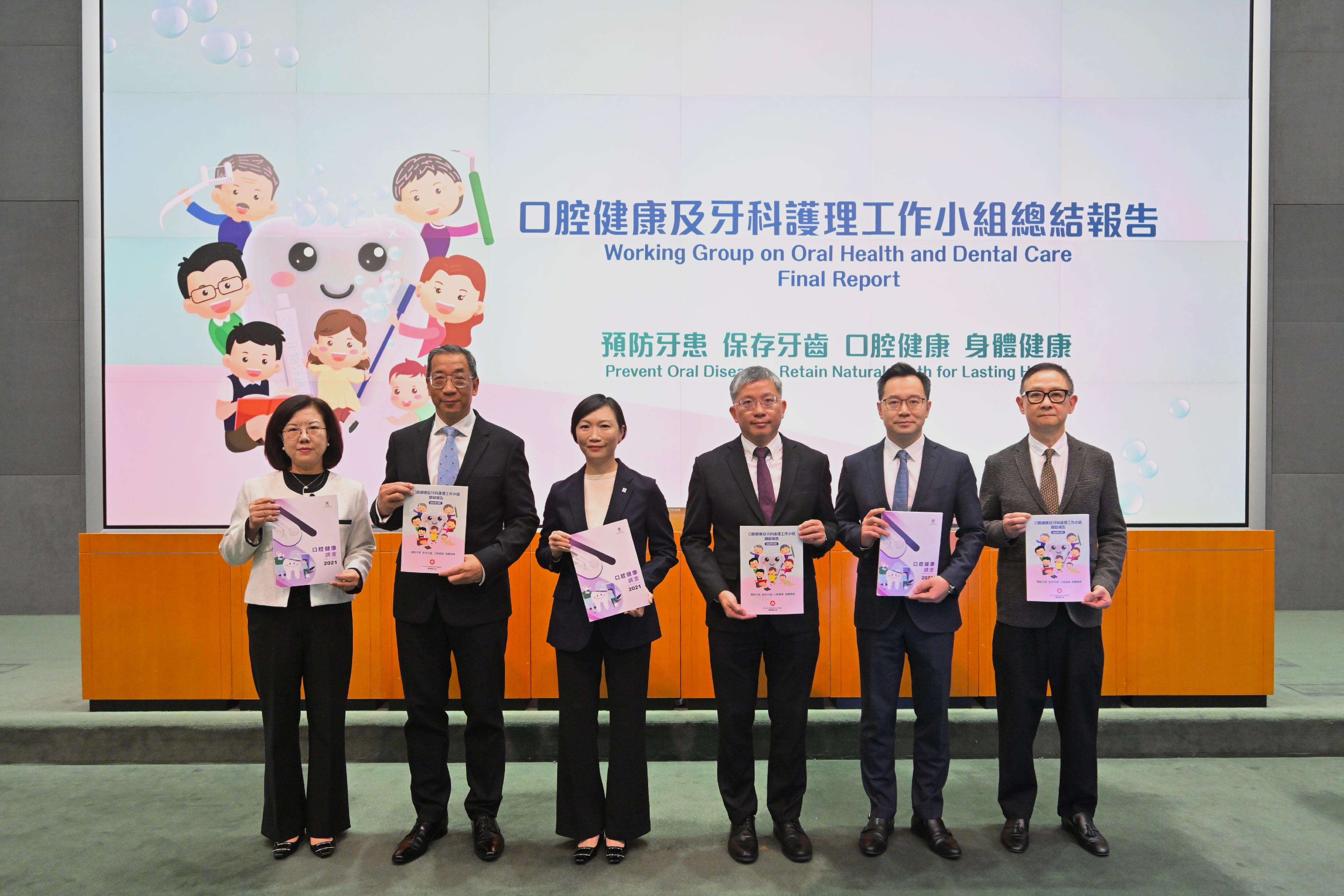The Government released the final report of the Working Group on Oral Health and Dental Care today (December 6). The Working Group recommended shifting the focus of the current oral health and dental care system from the prevailing treatment-oriented tendency to an approach targeting prevention, early identification, and timely intervention. The Working Group also recommended adopting oral health policies that encourage better oral hygiene habits among citizens, thereby enhancing their oral health through retention of teeth and eventually achieving the goal of overall good health and well-being. The Government concurred with the strategic recommendations of the Working Group and formulated a corresponding Oral Health Action Plan to adopt the strategies of widely promoting among citizens across all age groups prevention-oriented primary oral healthcare while providing essential dental care services targeting underprivileged groups.
Recommendations on oral health policies and development strategies
—————————————————————————–
With reference to the Global Strategy and Action Plan on Oral Health 2023–2030 of the World Health Organization and China's Oral Health Action Plan (2019-2025) released by the National Health Commission, the Working Group recommended the Government adopt the following oral health policies:
- Oral health constitutes an integral component of general health. The Government's oral health policies aim to enable all Hong Kong citizens to improve their oral hygiene and lifestyles conducive to further enhancing both oral health and general health levels;
- The Government will assist citizens in managing their oral health through publicity and education as well as promotion and development of primary oral health and dental care, with a view to putting into action prevention, early identification and timely intervention of dental diseases with the objective of retaining teeth; and
- The Government will provide appropriate oral health and dental care services for underprivileged groups with financial difficulties and special needs in a bid to ensure access to essential dental care services by these groups.
Having reviewed the reports of the oral health survey, the Working Group noted that the public health measures on oral health implemented over time have borne fruit, resulting in a relatively satisfactory level of oral health among citizens. However, the risk of having dental diseases and tooth loss persist, implying that there is need for better prevention. The Working Group also observed that the Government has been substantially increasing the amount of resources for directly provided or subsidised dental services over the years, with relevant expenditure approaching $1.3 billion in 2023/24, but the utilisation of resources has skewed towards curative treatment instead of prevention. There was also a lack of holistic examination on the cost-effectiveness of resources devoted.
The Working Group considered that preventive primary oral healthcare should be pushed ahead at full steam to reduce the demand for curative dental treatment. The cost-effectiveness and sustainability of resource utilisation as well as the priority of providing and subsidising dental services should also be reviewed such that resources will be more effectively utilised to promote primary oral healthcare towards the goal of improving citizens' oral health by focusing on prevention, early identification and timely intervention, thereby achieving the policy objective of enhancing citizens' health. To this end, the Working Group recommended the adoption of the approach to promote prevention-oriented primary oral healthcare among citizens across all age groups while providing essential dental care services for underprivileged groups in particular. Such an approach will serve as the strategy for the future development of the oral health and dental care system, as follows:
Community-wide preventive primary oral healthcare: To actively develop prevention-oriented primary oral healthcare through extensive promotion to Hong Kong citizens across different age groups, assisting them in managing their oral health, establishing good oral hygiene habits and lifestyles, and seeking regular oral check-ups and risk assessments of their own accord;
Essential dental care services targeting underprivileged groups: To focus on the provision of essential dental services through the public system or subsidy programmes for underprivileged groups who have difficulties in accessing dental care, namely those with financial difficulties, persons with disabilities or special needs and high-risk groups are to receive preventive and curative oral health and dental care services; and
The Working Group also considered various supporting conditions such as dental professional manpower resources, legal regulations, service models, financial arrangements and the use of electronic dental record systems, and subsequently put forward a series of strategic recommendations to the Government.
Oral Health Action Plan
————————–
Concurring with the recommendation directions of the Working Group, the Government developed a corresponding Oral Health Action Plan in response to various strategic recommendations of the Working Group.
In accordance with the strategy of developing community-wide preventive primary oral healthcare, the action plan covers the following measures to be implemented next year:
- To pilot risk assessment and oral hygiene instruction services at certain District Health Centres/District Health Centre Expresses;
- To introduce preventive dental services for preschool children aged up to 6 years by providing regular oral check-ups and care guidance;
- To launch the Primary Dental Co-care Pilot Scheme for Adolescents to incentivise regular oral check-ups among adolescents aged between 13 and 17 by providing Government subsidies under co-payment arrangements;
- To encourage citizens to receive regular oral check-ups. For adults in particular, employers offering dental benefits will be encouraged to drive their employees to receive regular oral check-ups through their prevailing plans. The dental sector will also be motivated to formulate the essential items in oral check-up packages for citizens of different age groups; and
- To encourage the elderly to make good use of Elderly Health Care Vouchers (EHCVs) for seeking oral check-ups. Through the Elderly Health Care Voucher Pilot Reward Scheme launched in 2023 and joint promotion efforts with the sector on the importance of oral check-ups, the elderly will be steered to better utilise the EHCVs for prevention dental services.
According to the strategy of providing essential dental services targeting underprivileged groups, the action plan will take forward the following measures:
- To launch the Community Dental Support Programme next year to provide dental services for underprivileged groups (including elderly persons with financial difficulties) with enhancement in capacity and service points and extension of service scope. This support programme will supplant the Community Care Fund Elderly Dental Assistance Programme by 2026;
- To continue streamlining the arrangements of dental services of the General Public Session of the Department of Health (DH). The DH will launch an Online Registration System for Dental General Public Session on December 30 and consider introducing eligibility criteria to put the service focus on helping those with financial difficulties; and
- To continue expanding special care dental services to further cover groups with other disabilities or special needs, while strengthening relevant dental services in hospitals and providing additional training.
The Oral Health Action Plan also includes various relevant supporting measures for strengthening professional dental manpower and the eHealth system. The Government will also establish a steering and advisory framework for oral health and dental care to keep advancing various measures.
The full text of the Working Group's final report is available on the website of the Health Bureau:
www.healthbureau.gov.hk/download/press_and_publications/otherinfo/241200_dental/e_final_report.pdf.
The Chairman of the Working Group and the Permanent Secretary for Health, Mr Thomas Chan, said, "I would like to express gratitude to all members of the Working Group for their efforts and contributions. The Government will, in accordance with the Working Group's recommendations, push ahead the development of community-wide preventive primary oral healthcare and continue to develop Hong Kong's oral health and dental care system along the approach of promoting prevention-oriented primary oral healthcare among citizens across all age groups while providing essential dental care services for underprivileged groups in particular. The Government looks forward to working with the dental profession, training institutions, non-governmental organisations (NGOs), and members of the public to promote oral health for all, enabling citizens to improve their oral health behaviours and retain their teeth through prevention, early identification and timely intervention of dental diseases, thereby genuinely embracing both oral and general health."
Working Group on Oral Health and Dental Care
—————————————————-
The Working Group on Oral Health and Dental Care, established as announced in "The Chief Executive's 2022 Policy Address", comprises members from the dental profession, medical sector, social welfare sector, patient groups, collaborating NGOs collaborating government-subsidised dental care programmes, and relevant well-regarded community personalities. The Working Group conducted a comprehensive review of dental care services provided or subsidised by the Government and put forward a series of recommendations including long-term strategies for oral health and dental care as well as enhancement of service scopes and models with the aim of safeguarding public oral health. The Working Group's tenure will expire at the end of this year. Throughout the term, seven meetings were held and an interim report was released at the end of last year.
Report of Oral Health Survey 2021
————————————–
The DH also released today the Report of Oral Health Survey 2021 which was conducted between 2021 and 2023. As revealed by the survey results, various oral health-related public health measures implemented by the Government over the years have effectively improved citizens' oral health, observing a general decline in tooth decay and a continuous increase in tooth retention among the elderly. The tooth decay level among Hong Kong children aged 5 and 12 and the proportion of elderly persons with complete tooth loss compares very favourably with global levels. That said, citizens still face a risk of having dental diseases and tooth loss. Strengthening of prevention is required.


